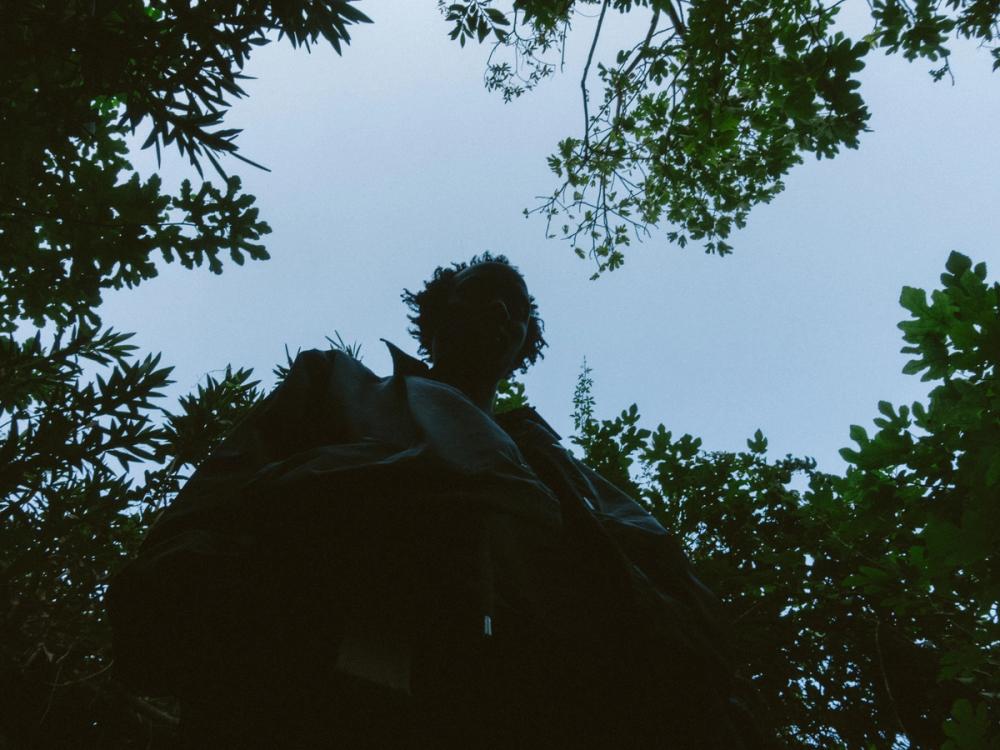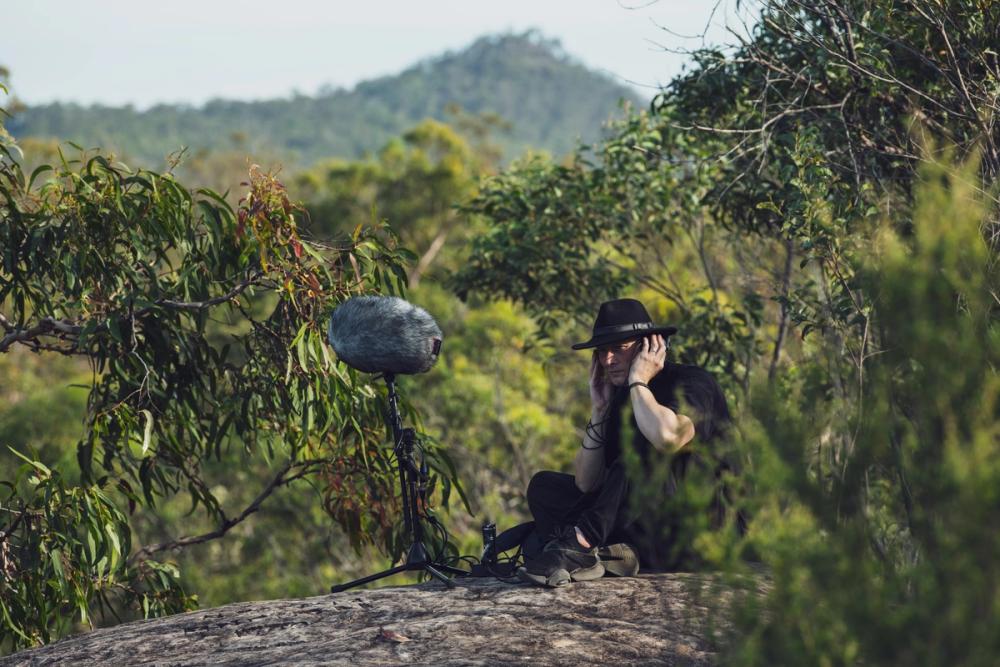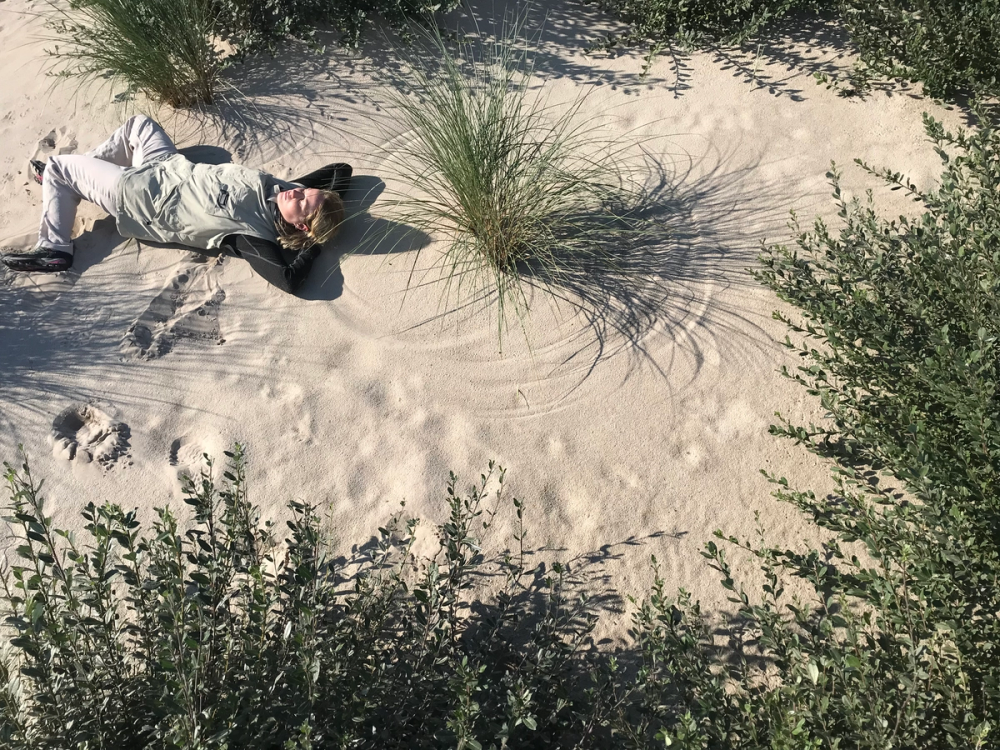KMRU
KMRU is the moniker of sound artist Joseph Kamaru, a prolific musician and producer with releases on Editions Mego, Warp Records and Seil Records. His music blends ambient tones with field recordings to immerse listeners in a tender and textured soundscape. Although not all of his work is related to climate, it’s one of many themes he can draw upon using sound, as KMRU explains: ‘I think there's a sensitivity to works which pose insights to consider perspectives beyond simply enjoying the “music”.’

KMRU’s staple of his live shows, 'Natur' combines field recordings from his native Kenya and new home in Germany, The piece is particularly evocative, contrasting the peace and non-human life and voices often heard in Nairobi with the bustling built environment of Berlin. KMRU’s composition holds together a complex juxtaposition:
‘With my music I’m not imposing any ideas of climate action, although there's a lot of emphasis on listening and how we can listen differently. I think this is also important to communicate as there's so much ongoing damage by the Occident – maybe sound can at least communicate ways to rethink perspectives.’
Kamaru often collaborates with others, most recently with Rafael Anton Irisarri on his album Facidisms, and for Oceanic Refractions – an immersive installation earlier this year that exhibited at CTM Festival in Germany featuring testimonies of Fijian, i-Kiribati and Papua New Guinean elders on kinship, self-determination and care in the face of global ecocide. As a sound designer, this latter work highlighted the role of listening to both nature and indigenous peoples in those regions most affected by climate collapse:
‘Oceanic Refraction heavily invokes thought on climate justice in the Oceania region. I think working with testimonials from Indigenous Elders from the Pacific gives a broader perspective of thinking about climate and how to listen to nature.’
Lawrence English
Lawrence English is a globally renowned artist, composer and curator based in Brisbane Australia. With a career spanning decades, he releases some of the most engaging and thoughtful ambient and drone music both himself, and through his own label Room40.

As English explains: ‘What I admire about ambient music is its capacity to be porous. It invites a listenership that is multi-dimensional and asks us to be available to the complexities of the music, as well as the settings in which we encounter it. That complexity is one of the beauties of ambient music that on first blush appears to some as being almost mono-dimensional.’
Far from a current trend, even in 2009 English understood the world had permanently changed. Looking back on the climate emergency in light of the 15th anniversary edition of his album, A Colour For Autumn, ‘it became resoundingly clear that even in the old world, seasonality was a thing that was known “then”, and unknowable “now’’, and that ‘Climate change (is) a lived experience and not merely a “possibility”.’
Confronting these issues squarely on has led English to make some tough decisions around flying for gigs and performances, one of the few financial streams left for musicians. ‘I have basically not toured solo since 2018 and have been offsetting what little touring I have done and the label’s production/freighting for the past decade through a fantastic regeneration program in Western Australia.’
This concern with flying, one shared by KMRU, and the wider conversation of individual responsibility and blame is something felt in many industries, but even with English’s self-described ‘modest’ actions, the bulk of responsibility lies beyond the actions of individual musicians:
‘The individualisation of this problem is something created to wash corporate responsibility and reminds us of the binds that capitalism places upon us, moment to moment. Music can’t fix this issue (of climate), art's role is to open a critical dialogue and to share ideas around a topic. It’s a way into the ideas, a way to begin to understand the questions you might want to ask of the world around you. It is not an answer to these challenges, but it can be a great prompt to opening up ways of thinking and being that can, at a communal level, have truly meaningful results.’
Ingri Høyland
Norwegian composer and sound artist Ingri Høyland uses sound to channel and examine our relationships with the natural world. Her acclaimed 2023 album Ode To Stone showcases this approach, with a collection of seven pieces inspired by the sands, dunes, stones and coast of newly commissioned national park in Northern Denmark. As Høyland explains:
‘In Ode to Stone I tried to physically and artistically stress that awareness and connection to our natural surroundings is also part of grasping a cosmic perspective. If we try to grasp the stone’s temporal perspective, we can maybe realize our own very narrow sensation of time. This way you can sense how natural forces surpass the human perspective. Connecting and caring for a stone, a leaf, the smell of heather or a cricket-berry, is part of changing the focus from one’s own autonomy, but rather to the relations and connections around you.’

Now based in Copenhagen, Høyland spoke about Denmark and Norway’s sometimes contradictory relationship between the national identity and pride in natural landscapes while simultaneously exploiting it for profit:
‘The landscape can be pretty extreme, which comes with a great humbleness towards nature. There is also “allemannsretten”, the right to roam freely everywhere, which also comes with a common responsibility to take care of nature and treat it with respect. I think this cultural heritage and identity, in contrast to the exploitation (of oil), creates a big paradox in people and society. Maybe like some sort of public shame and sorrow.’
On ambient music’s capacity to channel these paradoxes for both musicians and audiences Høyland explains:
‘I hope and believe ambient music at least can offer an experience for slowness and softness, without linear direction, and a contrast to efficiency, productivity and climax. Ambient music often offers enough space for people to connect their thoughts. The same way your thoughts actually manage to meet and connect when staring at the sea or into the forest. If people are more receptive is difficult to say, but I think it’s natural to look for new solutions, options and arenas when one might feel trapped by the threats we’re dealing with. I look towards literature by Ursula K. Le Guin etc, as her approach to sci-fi suggests thought experiments which offer new tools, language, perspectives on how to approach untying societal (individual and environmental) knots. I think ambient and experimental sound works can do the same, creating a space for slowly rearranging thoughts, sensations and perspectives.’
–
Given that the climate emergency is a race against time, slowing down and reflecting can feel counter intuitive. But by listening, an act itself and a thread running through the practice of these artists, we can more deeply understand the ‘why’ of what we’re doing better connect ourselves to each other, and the natural world with which we’ve so drastically fallen out of balance.
More Reads
Music
In Tune with Nature: encoding climate change in melody
Keep readingEnvironmental knowledge can be encountered in an incredible array of places and ways. Eesha Srinivas, a musician of the Dhrupad tradition, describes the process of coming to know the changing climate via environmental information encoded in ragas. Edited by Adham Smart.
By Eesha SrinivasKeep readingMusic
The Sounds of the Climate Emergency
Keep readingField recordings are atmospheric conditions in which to create an album – but they’re also being used to understand the world around us a little better. Gail Tasker looks into efforts to catalogue the sounds of our changing planet. She finds works that tell ancient stories, uncover geographical mysteries and record the drivers of the climate crisis. Edited by Katie Urquhart.
By Gail TaskerKeep readingMusic
Grimes, Billie and Lana: the rise of climate superpop
Keep readingReflecting on the rise of climate imagery in modern pop music, Arielle Domb reviews Grimes' incendiary new offering Miss Anthropocene.
By Arielle DombKeep reading- Read more
